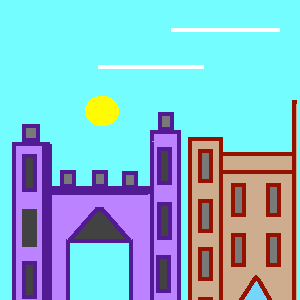

Friday, September 19, after breakfast Dr. Johnson and I set out in Dr. Taylor's chaise to go to Derby. The day was fine, and we resolved to go by Keddlestone, the seat of Lord Scarsdale, that I might see his Lordship's fine house. I was struck with the magnificence of the building; and the extensive park, with the finest verdure, covered with deer, and cattle, and sheep, delighted me. The number of old oaks, of an immense size, filled me with a sort of respectful admiration: for one of them sixty pounds was offered. The excellent smooth gravel roads; the large piece of water formed by his Lordship from some small brooks, with a handsome barge upon it; the venerable Gothick church, now the family chapel, just by the house; in short, the grand group of objects agitated and distended my mind in a most agreeable manner.
'One should think (said I) that the proprietor of all this must be happy.'
—' Nay, Sir, (said Johnson,) all this excludes but one evil— poverty.'
Our names were sent up, and a well-drest elderly housekeeper, a most distinct articulator, shewed us the house; which I need not describe, as there is an account of it published in Adam's Works in Architecture. Dr. Johnson thought better of it to-day than when he saw it before; for he had lately attacked it violently, saying,
'It would do excellently for a town-hall. The large room with the pillars (said he) would do for the Judges to sit in at the assizes; the circular room for a jury-chamber; and the room above for prisoners.'
Still he thought the large room ill lighted, and of no use but for dancing in; and the bed-chambers but indifferent rooms; and that the immense sum which it cost was injudiciously laid out.
Dr. Taylor had put him in mind of his appearing pleased with the house.
'But (said he) that was when Lord Scarsdale was present. Politeness obliges us to appear pleased with a man's works when he is present. No man will be so ill bred as to question you. You may therefore pay compliments without saying what is not true. I should say to Lord Scarsdale of his large room, "My Lord, this is the most costly room that I ever saw;" which is true.'
Dr. Manningham, physician in London, who was visiting at Lord Scarsdale's, accompanyed us through many of the rooms, and soon afterwards my Lord himself, to whom Dr. Johnson was known, appeared, and did the honours of the house. We talked of Mr. Langton. Johnson, with a warm vehemence of affectionate regard, exclaimed,
'The earth does not bear a worthier man than Bennet Langton.'
We saw a good many fine pictures, which I think are described in one of Young's Tours. There is a printed catalogue of them which the housekeeper put into my hand; I should like to view them at leisure.
I was much struck with Daniel interpreting Nebuchadnezzar's dream by Rembrandt.
We were shown a pretty large library. In his Lordship's dressing-room lay Johnson's small Dictionary: he shewed it to me, with some eagerness, saying, 'Look 'ye!' He observed, also, Goldsmith's Animated Nature; and said, 'Here's our friend! The poor Doctor would have been happy to hear of this.'
In our way, Johnson strongly expressed his love of driving fast in a post-chaise.
'If (said he) I had no duties, and no reference to futurity, I would spend my life in driving briskly in a post-chaise with a pretty woman; but she should be one who could understand me, and would add something to the conversation.'
I observed, that we were this day to stop just where the Highland army did in 1745.
JOHNSON. 'It was a noble attempt.'
BOSWELL. 'I wish we could have an authentick history of it.'
JOHNSON. 'If you were not an idle dog you might write it, by collecting from every body what they can tell, and putting down your authorities.'
BOSWELL. 'But I could not have the advantage of it in my life-time.'
JOHNSON. 'You might have the satisfaction of its fame, by printing it in Holland; and as to profit, consider how long it was before writing came to be considered in a pecuniary view. Baretti says, he is the first man that ever received copy-money in Italy.'
I said that I would endeavour to do what Dr. Johnson suggested; and I thought that I might write so as to venture to publish my History of the Civil War in Great-Britain in 1745 and 1746 without being obliged to go to a foreign press.
When we arrived at Derby, Dr. Butter accompanied us to see the manufactory of china there. I admired the ingenuity and delicate art with which a man fashioned clay into a cup, a saucer, or a tea-pot, while a boy turned round a wheel to give the mass rotundity. I thought this as excellent in its species of power, as making good verses in its species. Yet I had no respect for this potter. Neither, indeed, has a man of any extent of thinking for a mere verse-maker, in whose numbers, however perfect, there is no poetry, no mind. The china was beautiful, but Dr. Johnson justly observed it was too dear; for that he could have vessels of silver, of the same size, as cheap as what were here made of porcelain.
I felt a pleasure in walking about Derby such as I always have in walking about any town to which I am not accustomed. There is an immediate sensation of novelty; and one speculates on the way in which life is passed in it, which, although there is a sameness every where upon the whole, is yet minutely diversified. The minute diversities in every thing are wonderful.
Talking of shaving the other night at Dr. Taylor's, Dr. Johnson said, 'Sir, of a thousand shavers, two do not shave so much alike as not to be distinguished.'
I thought this not possible, till he specified so many of the varieties in shaving; —holding the razor more or less perpendicular; — drawing long or short strokes; — beginning at the upper part of the face, or the under; — at the right side or the left side. Indeed, when one considers what variety of sounds can be uttered by the windpipe, in the compass of a very small aperture, we may be convinced how many degrees of difference there may be in the application of a razor.
We dined with Dr. Butter, whose lady is daughter of my cousin Sir John Douglas, whose grandson is now presumptive heir of the noble family of Queensberry. Johnson and he had a good deal of medical conversation. Johnson said, he had somewhere or other given an account of Dr. Nichols's discourse De Anima Medica.
He told us 'that whatever a man's distemper was, Dr. Nichols would not attend him as a physician, if his mind was not at ease; for he believed that no medicines would have any influence. He once attended a man in trade, upon whom he found none of the medicines he prescribed had any effect: he asked the man's wife privately whether his affairs were not in a bad way?
She said no. He continued his attendance some time, still without success. At length the man's wife told him, she had discovered that her husband's affairs were in a bad way.

When Goldsmith was dying, Dr. Turton said to him, "Your pulse is in greater disorder than it should be, from the degree of fever which you have: is your mind at ease?" Goldsmith answered it was not.'
After dinner, Mrs. Butter went with me to see the silk-mill which Mr. John Lombe had had a patent for, having brought away the contrivance from Italy. I am not very conversant with mechanicks; but the simplicity of this machine, and its multiplied operations, struck me with an agreeable surprize. I had learnt from Dr. Johnson, during this interview, not to think with a dejected indifference of the works of art, and the pleasures of life, because life is uncertain and short; but to consider such indifference as a failure of reason, a morbidness of mind; for happiness should be cultivated as much as we can, and the objects which are instrumental to it should be steadily considered as of importance, with a reference not only to ourselves, but to multitudes in successive ages. Though it is proper to value small parts, as

'Sands make the mountain, moments make the year;'
yet we must contemplate, collectively, to have a just estimation of objects. One moment's being uneasy or not, seems of no consequence; yet this may be thought of the next, and the next, and so on, till there is a large portion of misery. In the same way one must think of happiness, of learning, of friendship. We cannot tell the precise moment when friendship is formed.
As in filling a vessel drop by drop, there is at last a drop which makes it run over; so in a series of kindnesses there is at last one which makes the heart run over. We must not divide objects of our attention into minute parts, and think separately of each part. It is by contemplating a large mass of human existence, that a man, while he sets a just value on his own life, does not think of his death as annihilating all that is great and pleasing in the world. If his imagination be not sickly and feeble, it 'wings its distant way' far beyond himself, and views the world in unceasing activity of every sort.
It must be acknowledged, however, that Pope's plaintive reflection, that all things would be as gay as ever, on the day of his death, is natural and common. We are apt to transfer to all around us our own gloom, without considering that at any given point of time there is, perhaps, as much youth and gaiety in the world as at another. Before I came into this life, in which I have had so many pleasant scenes, have not thousands and ten thousands of deaths and funerals happened, and have not families been in grief for their nearest relations? But have those dismal circumstances at all affected me? Why then should the gloomy scenes which I experience, or which I know, affect others? Let us guard against imagining that there is an end of felicity upon earth, when we ourselves grow old, or are unhappy.

(classix comix™ is brought to you by Bob’s Bowery Bar, conveniently located at the northwest corner of Bleecker and the Bowery: “Have you found yourself in this time of economic crisis unemployed, through no fault of your own? Brother (or sister!) I have been ‘there’ too! And yet perhaps you still have a hankering for a hot and nutritious but affordable meal somewhere other than in the tiny kitchen of your cold-water slum flat.
Well, why not stop in at Bob’s Bowery Bar and order a meal I have often in lean times availed myself of, to wit, ‘Bob’s Beans on Toast’, a quarter pound of Bob’s Mom’s baked beans ‘n’ fatback poured over half-inch slices of day-old crusty toasted sourdough – a filling and delicious repast at the low, low price of two bits! (And, yes, Bob will cash your welfare or unemployment check absolutely free, gratis and for nothing!)” – Horace P. Sternwall, host of Bob’s Bowery Bar Presents Philip Morris Commander’s Grand-Guignol Theatre, broadcast live Fridays at midnight (EST) exclusively on the Dumont Television Network. This week’s play: The Redundant Corpse by Horace P. Sternwall, starring Hyacinth Wilde and Roscoe Karns, with special guest star Miss Kitty Carlisle as “Mrs. Murgatroyd”.)

part 156
|
|
































































